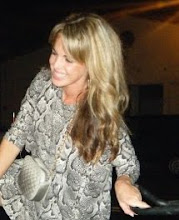I didn't expect to find anything of depth when I glanced over a review of the new movie "Forgetting Sarah Marshall" by Judd Apatow. But the article surprised me, and I had to keep reading, and then I had to cut and paste certain parts to remember, and then I felt I wanted to share them...not because I'm a big fan of Apatow's movies, but for this particular writer's (Jim Emerson) insight.
...If there's a myth we cling to in America, it's that life is arranged in stages of "personal growth," and each one leads to a higher plane of enlightenment. But Apatow seems at least somewhat ambivalent about the idea, which is why his movies [40 Year Old Virgin, Knocked Up, Superbad] tend to end with reunions rather than the weddings or engagements that have concluded traditional comedies for centuries...
...You know what they say about the difference between comedy and tragedy -- it's all in where you choose to end the story. Apatow's films begin with something less than tragedy ("Are you living your dream?" Ben's dad asks him sarcastically in "Knocked Up") and end with something less than a love-you-forever promise...
...The problem comes down to this: The guys are pretty sure they love the girls, but feel those feelings ought to be (1) self-evident; and (2) enough. So what if they have to sneak off to play fantasy baseball, or eat Fruit Loops and wear Costco sweatpants around the house every day for a week? Who cares?
Well, the women do. They're pretty sure they love their man-child mates, too, but they also know that's absolutely not enough for them. They need the guys to change. What's more, the women need them to want to change -- to better suit their better halves. This appears to be an unresolvable lose-lose scenario, but there it is, and there's no avoiding it. (In this respect, the teenagers of "Superbad" are probably the most mature in Apatow's body of work so far: The boys and the girls really do like each other for who they are. But they're still in "like." Love, which to some is a sacred declaration of perpetual ownership, changes everything.)...
...In "Knocked Up," Pete confesses a revelation to Ben when they're high on mushrooms in Vegas: "The biggest problem in our marriage is that she wants me around. She loves me so much that she wants me around all the time. That's our biggest problem, and I can't even accept that? Like, that upsets me?"
Everybody knows what they think they're supposed to feel, but then what? If Apatow's characters "learn" anything it's not that they should have read the baby books, or that it's time to put away the action figure of the Six Million Dollar Man.
It's that choices -- any choices -- don't solve anything. Even when they're the "right" ones, living with them may be just as hard as if they'd made the "wrong" ones. But once you've made them, there's no way to know for sure.

Well, the women do. They're pretty sure they love their man-child mates, too, but they also know that's absolutely not enough for them. They need the guys to change. What's more, the women need them to want to change -- to better suit their better halves. This appears to be an unresolvable lose-lose scenario, but there it is, and there's no avoiding it. (In this respect, the teenagers of "Superbad" are probably the most mature in Apatow's body of work so far: The boys and the girls really do like each other for who they are. But they're still in "like." Love, which to some is a sacred declaration of perpetual ownership, changes everything.)...
...In "Knocked Up," Pete confesses a revelation to Ben when they're high on mushrooms in Vegas: "The biggest problem in our marriage is that she wants me around. She loves me so much that she wants me around all the time. That's our biggest problem, and I can't even accept that? Like, that upsets me?"
Everybody knows what they think they're supposed to feel, but then what? If Apatow's characters "learn" anything it's not that they should have read the baby books, or that it's time to put away the action figure of the Six Million Dollar Man.
It's that choices -- any choices -- don't solve anything. Even when they're the "right" ones, living with them may be just as hard as if they'd made the "wrong" ones. But once you've made them, there's no way to know for sure.


1 comment:
He does make insightful, interesting observations. I can see why you were intrigued.
Post a Comment